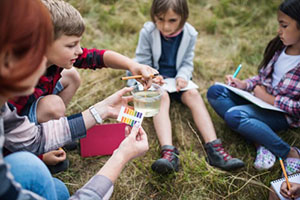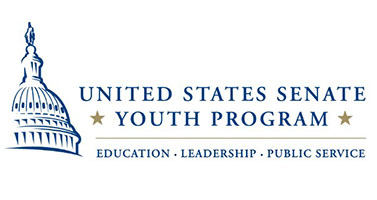Social Studies
The New Jersey Student Learning Standards (NJSLS) are reviewed and revised every five years. The 2020 NJSLS in Social Studies were adopted by the State Board of Education on June 3, 2020. Districts are required to implement these standards through the updating of social studies curricula by September 2022. The standards provide the framework for curricular instructions as well as provide the performance expectations students are expected to meet by the end of each grade band.
Implementation of the standards is mandated by the New Jersey Administrative Code. District boards of education shall ensure that curriculum and instruction are designed and delivered in such a way that all students are able to demonstrate the knowledge and skills specified by the New Jersey Student Learning Standards (N.J.A.C. 6A:8-3.1(a)). The district must provide sufficient time and resources to ensure that all students can demonstrate that they have met or exceeded the expectations set forth in the New Jersey Student Learning Standards.
2020 New Jersey Student Learning Standards for
Social Studies
Intent and Spirit
All students receive social studies instruction from Kindergarten through grade 12. Today’s challenges are complex, have global implications, and are connected to people, places, and events of the past. The study of social studies focuses on deep understanding of concepts that enable students to think critically and systematically about local, regional, national, and global issues. Authentic learning experiences that enable students to apply content knowledge, develop social studies skills, and collaborate with students from around the world prepare New Jersey students for college, careers, and civic life. The natural integration of technology in social studies education allows students to overcome geographic borders, apply scientific and mathematical analysis to historical questions and contemporary issues, appreciate cultural diversity, and experience events through the examination of primary sources. The 2020 New Jersey Student Learning Standards — Social Studies (NJSLS-2020) are informed by national and state standards and other documents such as the College, Career, and Civic Life (C3) Framework for Social Studies State Standards, as well as those published by the National Center for History Education, National Council for Social Studies, National Council for Geographic Education, Center for Civic Education, National Council on Economic Education, National Assessment of Educational Progress, and the Partnership for 21st Century Skills. Social studies instruction occurs throughout the K–12 spectrum, building in sophistication of learning about history, economics, geography, and civics at all ages.
Mission
Social studies education provides learners with the knowledge, skills, attitudes, and perspectives needed to become active, informed, and contributing members of local, state, national, and global communities.
Vision
An education in social studies fosters a population that:
- Is civic-minded, globally aware, and socially responsible;
- Exemplifies fundamental values of democracy and human rights through active participation in local, state, national and global communities;
- Makes informed decisions about local, state, national, and global events based on inquiry and analysis;
- Considers multiple perspectives, values diversity, and promotes cultural understanding;
- Recognizes the relationships between people, places, and resources as well as the implications of an interconnected global economy;
- Applies an understanding of critical media literacy skills when utilizing technology to learn, communicate, and collaborate with diverse people around the world; and
- Discerns fact from falsehood and critically analyzes information for validity and relevance.
The standards provide a guide for districts to determine grade level curricula. Districts decide what courses and content are taught at each grade level based on the grade-banded core ideas and performance expectations. There are three standards taught across kindergarten through twelfth grade.
- 6.1 U.S. History in the World (Grades kindergarten through 12)
- 6.2 World History (Grades 8 through 12)
- 6.3 Active Citizenship in the 21st Century (Grades kindergarten through 12)
The standards are organized by grade-band performance expectations, which means the performance expectation can be taught at any grade within the grade-band as determined by the local district. The following provides an overview of content for each grade-band.
Kindergarten through Grade 2
Social studies instruction in early elementary focuses on developing student’s understanding of their role in their family, community, county and world. Students learn foundational ideas of government, democracy, human rights, the common good, citizenship, and civil discourse as well as explore the American identity through symbols, holidays, and monuments that are reflective of our values and principles.
Grades 3 through 5
In upper elementary, social studies instruction begins with the various levels of government functions, powers and responsibilities. Students explore topics of geography and economics through a local and state context, while learning the various histories, cultures and perspectives of United States starting with the native populations of the U.S. through 1763 with an emphasis on the geography, history and civics of New Jersey.
Grades 6 through 8
In middle school, students embark on instruction typically taught in a credit-based course format. Each credit is equivalent to a minimum of 40 minutes per week. Throughout this grade band, the performance expectations covered in standard 6.1 U.S. History focuses on the Revolution through Reconstruction (1754-1877) and standard 6.2 World History explores the beginning of man through global encounters (10,000 BCE -1450 CE). Standard 6.3 Active Citizenship in the 21st Century has students build their understanding of civics, government and human rights.
In addition, students are required to complete a civics course, minimum two quarters or equivalent, that addresses the values and principles underlying the American system of constitutional democracy; the function and limitations of government; and the role of a citizen in a democratic society.
Grades 9 through 12
High school students are required to take a minimum of a world history course as well as two years of U.S. History, consisting of 15 credits. Standard 6.1, U.S. History performance expectations encompass colonization through today (1585–present). The World History performance expectations in standard 6.2 cover the emergence of the first global age through contemporary issues (1350–present).
In addition, students must meet or exceed the expectations set forth in standard 6.3 Active Citizenship in the 21st Century. These performance expectations focus on students addressing contemporary national and global issues in a solutions-oriented context.
The practices are the skills that individuals who work in the field of social sciences use on a regular basis. Because the purpose of social studies is to provide students with the knowledge, skills and attitudes they need to be active, informed, responsible individuals and contributing members of their communities, many of the practices can be applied to daily life. Curriculum writers and educators will want to consider how they can design learning experiences that will enable their students to develop these skills in conjunction with the content knowledge reflected in the core ideas and performance expectations (Citizens, 2008). Each disciplinary practice below is accompanied by sample performance expectations that illustrate each of the practices.
Developing Questions and Planning Inquiry
Developing insightful questions and planning effective inquiry involves identifying the purposes of different questions to understand the human experience, which requires addressing real world issues. Inquiries incorporating questions from various social science disciplines build understanding of the past, present and future; these inquiries investigate the complexity and diversity of individuals, groups, and societies.
- 6.1.2.HistorySE.3: Use historical data from a variety of sources to investigate the development of a local community (e.g., origins of its name, originating members, important historical events and places).
- 6.1.5.GeoPP.5: Describe how the migration and settlement patterns of Native American groups impacted different regions of the Western Hemisphere.
Gathering and Evaluating Sources
Finding, evaluating and organizing information and evidence from multiple sources and perspectives are the core of inquiry. Effective practice requires evaluating the credibility of primary and secondary sources, assessing the reliability of information, analyzing the context of information, and corroborating evidence across sources. Discerning opinion from fact and interpreting the significance of information requires thinking critically about ourselves and the world.
- 6.1.2.HistoryCC.1: Use multiple sources to create a chronological sequence of events that describes how and why your community has changed over time.
- 6.1.5.GeoGI.1: Use multiple sources to evaluate the impact of the movement of people from place to place on individuals, communities, and regions.
Seeking Diverse Perspectives
Making sense of research findings requires thinking about what information is included, whether the information answers the question, and what may be missing, often resulting in the need to complete additional research. Developing an understanding of our own and others’ perspectives builds understanding about the complexity of each person and the diversity in the world. Exploring diverse perspectives assists students in empathizing with other individuals and groups of people; quantitative and qualitative information provides insights into specific people, places, and events, as well as national, regional, and global trends.
- 6.1.2.HistoryUP.1: Use primary sources representing multiple perspectives to compare and make inferences about why there are different accounts of the same event.
- 6.1.5.HistorySE.1: Examine multiple accounts of early European explorations of North America including major land and water routes, reasons for exploration, and the impact the exploration had.
Developing Claims and Using Evidence
Developing claims requires careful consideration of evidence, logical organization of information, self-awareness about biases, application of analysis skills, and a willingness to revise conclusions based on the strength of evidence. Using evidence responsibly means developing claims based on factual evidence, valid reasoning, and a respect for human rights.
- 6.1.2.CivicsPR.2: Cite evidence that explains why rules and laws in school and communities are needed.
- 6.1.5.GeoHE.2: Cite examples of how technological advances have changed the environment in New Jersey and the United States (e.g., energy, transportation, communications).
Presenting Arguments and Explanations
Using a variety of formats designed for a purpose and an authentic audience forms the basis for clear communication. Strong arguments contain claims with organized evidence and valid reasoning that respects the diversity of the world and the dignity of each person. Writing findings and engaging in civil discussion with an audience provides a key step in the process of thinking critically about conclusions and continued inquiry.
- 6.1.2.HistoryCA.1: Make an evidence-based argument about how and why communities change over time (e.g., locally, nationally, globally).
- 6.1.5.HistoryCA.1: Craft an argument, supported with historical evidence, for how demographics (i.e., race, gender, and economic status) affected social, economic, and political opportunities during the Colonial era.
Engaging in Civil Discourse and Critiquing Conclusions
Assessing and refining conclusions through metacognition, further research, and deliberative discussions with diverse perspectives sharpens the conclusions and improves thinking as a vital part of the process of sensemaking. Responsible citizenship requires respectfully listening to and critiquing claims by analyzing the evidence and reasoning supporting them. Listening to and understanding contrary views can deepen learning and lay the groundwork for seeking consensus.
- 6.1.2.CivicsPD.1: Engage in discussions effectively by asking questions, considering facts, listening to the ideas of others, and sharing opinions.
- 6.3.5.GeoGI.1: Use technology to collaborate with others who have different perspectives to examine global issues, including climate change and propose possible solutions.
Taking Informed Action
After thoroughly investigating questions, taking informed action means building consensus about possible actions and planning strategically to implement change. Democracy requires citizens to practice discussion, negotiation, coalition-seeking, and peaceful conflict resolution. When appropriate, taking informed action involves creating and/or implementing action plans designed to solve problems and create positive change.
- 6.3.2.CivicsPD.1: With adult guidance and support, bring awareness of a local issue to school and/or community members and make recommendations for change.
- 6.3.5.CivicsPD.3: Propose a solution to a local issue after considering evidence and the perspectives of different groups, including community members and local officials.
In addition to the NJ Student Learning Standards, the following shall be integrated into K–12 Social Studies curricula:
- Interdisciplinary connections (N.J.A.C. 6A:8-1.1)
- 21st century themes and skills (N.J.A.C. 6A:8-1.1)*
- Holocaust and genocides (N.J.S.A. 18A:35-28)*
- History and contributions of African-Americans (Amistad Law) (N.J.S.A. 18A:35-4.43)*
- Highlight and promote diversity and inclusion (Diversity & Inclusion Law) (N.J.S.A. 18A:35-4.36a)
- Asian American, Pacific Islander history and contributions (N.J.S.A 18A:35-4.44)
Elementary Social Studies Requirements
- Course of study in civics, geography and history of New Jersey* (N.J.S.A. 18A:35-3)
Middle School Requirements
- Course of study in U.S. Constitution* (N.J.S.A. 18A: 6-3)
- Two quarters or equivalent Civics course (N.J.S.A. 18A:35-41)
- Political, economic, and social contributions of persons with disabilities and lesbian, gay, bisexual, and transgender people (N.J.S.A. 18A:35-4.35)
High School Requirements
- At least 15 credits in social studies (N.J.A.C. 6A:8-5.1)
- Integration of civics, economics, geography and global content in all course offerings* (N.J.A.C. 6A:8-5.1)
- Course of study in U.S. Constitution* (N.J.S.A. 18A: 6-3)
- Two years of US History in high schools including history of New Jersey and of African-Americans (N.J.S.A. 18A:35-1)
- Political, economic, and social contributions of persons with disabilities and lesbian, gay, bisexual, and transgender people (N.J.S.A. 18A:35-4.35)
*Already integrated into existing New Jersey Student Learning Standards
The resources provided on this webpage are for informational purposes only. All resources must meet the New Jersey Department of Education’s (NJDOE) accessibility guidelines. Currently, the NJDOE aims to conform to Level AA of the Web Content Accessibility Guidelines (WCAG 2.1). However, the NJDOE does not guarantee that linked external sites conform to Level AA of the WCAG 2.1. Neither the NJDOE nor its officers, employees or agents specifically endorse, recommend or favor these resources or the organizations that created them. Please note that the NJDOE has not reviewed or approved the materials related to the programs.
 Official Site of The State of New Jersey
Official Site of The State of New Jersey






